Germany is a federal, parliamentary, representative democratic republic. The German political system operates under a framework laid out in the 1949 constitutional document known as the Grundgesetz (Basic Law). By calling the document Grundgesetz, rather than Verfassung (constitution), the authors expressed the intention that it would be replaced by a proper constitution once Germany was reunited as one state. Amendments to the Grundgesetz generally require a two-thirds majority of both chambers of the parliament; the articles guaranteeing fundamental rights, the separation of powers, the federal structure, and the right to resist attempts to overthrow the constitution are valid in perpetuity and cannot be amended.[41] Despite the initial intention, the Grundgesetz remained in effect after the German reunification in 1990, with only minor amendments.
The Bundeskanzler (Federal Chancellor)—currently Angela Merkel—is thehead of government and exercises executive power, similar to the role of a Prime Minister in other parliamentary democracies. Federal legislative power is vested in the parliament consisting of the Bundestag (Federal Diet) andBundesrat (Federal Council), which together form a unique type of legislative body. The Bundestag is elected through direct elections, yet abiding proportional representation. The members of the Bundesrat represent the governments of the sixteen federal states and are members of the state cabinets. The respective state governments have the right to appoint and remove their envoys at any time.
The Bundespräsident (Federal President)—currently Horst Köhler—is the head of state, invested primarily with representative responsibilities and powers. He is elected by the Bundesversammlung (federal convention), an institution consisting of the members of the Bundestag and an equal number of state delegates. The second highest official in the German order of precedence is the Bundestagspräsident (President of the Bundestag), who is elected by the Bundestag and responsible for overseeing the daily sessions of the body. The third-highest official and the head of government is the Chancellor, who is nominated by the Bundespräsident after being elected by the Bundestag. The Chancellor can be removed by a constructive motion of no confidence by the Bundestag, where constructive implies that the Bundestag simultaneously elects a successor.
Since 1949, the party system has been dominated by the Christian Democratic Union and the Social Democratic Party of Germany with all chancellors hitherto being member of either party. However, the smaller liberal Free Democratic Party (which has had members in theBundestag since 1949) and the Alliance '90/The Greens (which has controlled seats in parliament since 1983) have also played important roles,[42] as they are regularly the smaller partner of a coalition government.
Law
The Judiciary of Germany is independent of the executive and the legislative branches. Germany has a civil or statute law system that is based on Roman law with some references to Germanic law. TheBundesverfassungsgericht (Federal Constitutional Court), located in Karlsruhe, is the German Supreme Court responsible for constitutional matters, with power of judicial review.[43] It acts as the highest legal authority and ensures that legislative and judicial practice conforms to the Basic Law for the Federal Republic of Germany (Basic Law). It acts independently of the other state bodies, but cannot act on its own behalf.
Germany's supreme court system, called Oberste Gerichtshöfe des Bundes, is specialised. For civil and criminal cases, the highest court of appeal is the Federal Court of Justice, located in Karlsruhe andLeipzig. The courtroom style is inquisitorial. Other Federal Courts are the Federal Labour Court in Erfurt, theFederal Social Court in Kassel, the Federal Finance Court in Munich and the Federal Administrative Courtin Leipzig.
Criminal law and private law are codified on the national level in the Strafgesetzbuch and the Bürgerliches Gesetzbuch respectively. The German penal system is aimed towards rehabilitation of the criminal; its secondary goal is the protection of the general public.[44] To achieve the latter, a convicted criminal can be put in preventive detention (Sicherungsverwahrung) in addition to the regular sentence if he is considered to be a threat to the general public. The Völkerstrafgesetzbuch regulates the consequences of crimes against humanity, genocide and war crimes. It gives German courts universal jurisdiction if prosecution by a court of the country where the crime was committed, or by an international court, is not possible.
State legislation
Legislative power is divided between the federation and the state level. The Basic Law presumes that all legislative power remains at the state level unless otherwise designated by the Basic Law itself.
Any federal law overrides state law if the legislative power lies at the federal level. A famous example is the purported Hessian provision for the death penalty, which goes against the ban on capital punishment under the Basic Law, rendering the Hessian provision invalid. The Bundesrat is the federal organ through which the states participate in national legislation. State participation in federal legislation is necessary if the law falls within the area of concurrent legislative power, requires states to administer federal regulations, or is so designated by the Basic Law. Every state has its own constitutional court. The Amtsgerichte, Landgerichte and Oberlandesgerichteare state courts of general jurisdiction. They are competent whether the action is based on federal or state law.
Many of the fundamental matters of administrative law remain in the jurisdiction of the states, though most states base their own laws in that area on the 1976 Verwaltungsverfahrensgesetz (Administrative Proceedings Act) covering important points of administrative law. The Oberverwaltungsgerichte are the highest level of administrative jurisdiction concerning the state administrations, unless the question of law concerns federal law or state law identical to federal law. In such cases, final appeal to the Federal Administrative Court is possible.
Foreign relations
Germany has played a leading role in the European Union since its inception and has maintained a strong alliance with France since the end of World War II. The alliance was especially close in the late 1980s and early 1990s under the leadership of Christian Democrat Helmut Kohl and Socialist François Mitterrand. Germany is at the forefront of European states seeking to advance the creation of a more unified and capable European political, defence and security apparatus.[45] Since its establishment on 23 May 1949, the Federal Republic of Germany has kept a notably low profile in international relations, because of both its recent history and its occupation by foreign powers.[46]
During the Cold War, Germany's partition by the Iron Curtain made it a symbol of East-West tensions and a political battleground in Europe. However, Willy Brandt's Ostpolitik was a key factor in the détente of the 1970s.[47] In 1999, ChancellorGerhard Schröder's government defined a new basis for German foreign policy by taking a full part in the decisions surrounding the NATO war against Yugoslavia and by sending German troops into combat for the first time since World War II.[48]
The governments of Germany and the United States are close political allies.[49] The 1948 Marshall Plan, U.S. support (JCS 1067) during the rebuilding process (Industrial plans for Germany) after World War II, as well as fraternisation (War children), and strong cultural ties have crafted a strong bond between the two countries, although Schröder's very vocal opposition to the Iraq War suggested the end of Atlanticism and a relative cooling of German-American relations.[50] The two countries are also economically interdependent: 8.8% of German exports are U.S.-bound and 6.6% of German imports originate from the U.S.[51] The other way around, 8.8% of U.S. exports ship to Germany and 9.8% of U.S. imports come from Germany.[51] Other signs of the close ties include the continuing position of German-Americans as the largest ethnic group in the U.S.[52] and the status of Ramstein Air Base (near Kaiserslautern) as the largest U.S. military community outside the U.S.[53]
Development aid
The development policy of the Federal Republic of Germany is an independent area of German foreign policy. It is formulated by the Federal Ministry for Economic Cooperation and Development (BMZ) and carried out by the implementing organisations. The German government sees development policy as a joint responsibility of the international community.[54]
Germany's official development aid and humanitarian aid for 2007 amounted to 8.96 billion euros (12.26 billion dollars), an increase of 5.9 per cent from 2006. It has become the world's second biggest aid donor after the United States.[55] Germany spent 0.37 per cent of its gross domestic product (GDP) on development, which is below the government's target of increasing aid to 0.51 per cent of GDP by 2010. The international target of 0.7% of GNP would have not been reached either.
Military
Germany's military, the Bundeswehr, is a military force with Heer (Army), Marine (Navy), Luftwaffe (Air Force), Zentraler Sanitätsdienst (Central Medical Services) and Streitkräftebasis (Joint Support Service) branches. Military service is compulsory for men at the age of 18, and conscripts serve nine-month tours of duty. Conscientious objectors may instead opt for an equal length of Zivildienst (roughly translated as civilian service), or a six year commitment to (voluntary) emergency services like a fire department, the Red Cross or the THW. In 2003, military spending constituted 1.5% of the country's GDP.[1] In peacetime, the Bundeswehr is commanded by the Minister of Defence, currently Franz Josef Jung. If Germany went to war, which according to the constitution is allowed only for defensive purposes, the Chancellor would become commander in chief of the Bundeswehr.[56]
The Bundeswehr employs 200,500 professional soldiers, 55,000 18-25 year-old conscripts who serve for at least nine months under current rules, and 2,500 active reservists at any given time. Roughly 300,000 reservists are available to the Armed Forces and participate in defense exercises as well as deployments abroad. Since 2001 women can serve in all functions of service without restriction, but they are not subject to conscription. There are presently around 14,500 women on active duty and a number of female reservists who take part in all duties including peacekeeping missions and other operations. Two female medical officers have been promoted to a General rank so far.
As of October 2006, the German military had almost 9,000 troops stationed in foreign countries as part of various international peacekeeping forces, including 1,180 troops stationed in Bosnia-Herzegovina; 2,844 Bundeswehr soldiers in Kosovo; 750 soldiers stationed as a part of EUFOR in the Democratic Republic of the Congo; and 2,800 German troops in the NATO-led ISAF force in Afghanistan. As of February 2007, Germany had about 3,000 ISAF troops in Afghanistan, the third largest contingent after the United States (14,000) and the United Kingdom (5,200).[57] Germany shares nuclear weapons with NATO, in the form of US nuclear weapons stationed at Büchel airbase.[58]
Demographics
With 82 million inhabitants, Germany is the most populous country in the European Union. Its fertility rateis one of the lowest in Europe and counts 1.41 children per woman.[1] Germany has a number of large cities, the most populous being Berlin, Hamburg, Munich, Cologne, Frankfurt and Stuttgart. By far the largest conurbation is the Rhine-Ruhr region (12 million), including Düsseldorf (the capital of NRW) and the cities of Cologne, Essen, Dortmund, Duisburg, and Bochum.
As of December 2004, about seven million foreign citizens were registered in Germany, and 19% of the country's residents were of foreign or partially foreign descent. The young are more likely to be of foreign descent than the old. 30% of Germans aged 15 years and younger have at least one parent born abroad. In the big cities 60% of children aged 5 years and younger have at least one parent born abroad.[59]
The largest group (2.7 million) is from Turkey, and a majority of the rest are from European states such asItaly, Serbia, Greece, Poland, and Croatia.[60][61] The United Nations Population Fund lists Germany as host to the third-highest number of international migrants worldwide, about 5% or 10 million of all 191 million migrants, or about 12% of the population of Germany.[62] As a consequence of restrictions to Germany's formerly rather unrestricted laws on asylum and immigration, the number of immigrants seeking asylum or claiming German ethnicity (mostly from the former Soviet Union) has been declining steadily since 2000.[63]
Large numbers of people with full or significant German ancestry are found in the United States (50 million),[64] Brazil (5 million)[65] and Canada(3 million).[66] About 3 million "Aussiedler" — ethnic Germans, mainly from Eastern Europe and the former Soviet Union — have resettled in Germany since 1987.[67]
Religion
Christianity is the largest religious denomination in Germany, with 52 million adherents (64%). [68] 26.5 million areProtestants (32.3%) and 25.5 million are Catholics (31.0%).[69] The second largest religion is Islam with 4.3 million adherents (5%)[70] followed by Buddhism and Judaism, both with around 200,000 adherents (c. 0.25%). Hinduismhas some 90,000 adherents (0.1%). All other religious communities in Germany have fewer than 50,000 (or less than 0.05%) adherents. About 24.4 million Germans (29.6%) have no registered religious denomination.
Protestantism is concentrated in the north and east and Roman Catholicism is concentrated in the south and west. The current Pope, Benedict XVI, was born in Bavaria. Non-religious people, including atheists and agnostics, make up 29.6% of the population, and are especially numerous in the former East Germany and major metropolitan areas.[71]
Of the 4.3 million Muslims, most are Sunnis and Alevites from Turkey, but there are a small number of Shi'ites.[72] 1.7% of the country's overall population declare themselves Orthodox Christians, Serbs and Greeks being the most numerous.[73] Germany has Europe's third-largest Jewish population (after France and the United Kingdom).[74] In 2004, twice as many Jews from former Soviet republics settled in Germany as in Israel, bringing the total Jewish population to more than 200,000, compared to 30,000 prior to German reunification. Large cities with significant Jewish populations include Berlin, Frankfurt and Munich.[75] Around 250,000 active Buddhists live in Germany; 50% of them are Asian immigrants.[76]
According to the Eurobarometer Poll 2005, 47% of German citizens agreed with the statement "I believe there is a God", whereas 25% agreed with "I believe there is some sort of spirit or life force" and 25% said "I do not believe there is any sort of spirit, god, or life force".[77]
Languages
German is the official and predominantly spoken language in Germany.[78] It is one of 23 official languages in the European Union, and one of the three working languages of the European Commission, along with English and French. Recognised native minority languages in Germany are Danish, Sorbian, Romany, andFrisian. They are officially protected by the ECRML. Most used immigrant languages are Turkish, Polish, the Balkan languages, and Russian.
The standard German is a West Germanic language and is closely related to and classified alongsideEnglish, Dutch, and the Frisian languages. To a lesser extent, it is also related to the East (extinct) andNorth Germanic languages. Most German vocabulary is derived from the Germanic branch of the Indo-European language family.[79] Significant minorities of words are derived from Latin and Greek, with a smaller amount from French and most recently English (known as Denglisch). German is written using the Latin alphabet. In addition to the 26 standard letters, German has three vowels with Umlauts, namely ä, ö, and ü, as well as the Eszett or scharfes S (sharp s) which is written "ß".
German dialects are distinguished from varieties of standard German. The German dialects are the traditional local varieties and are traced back to the different German tribes. Many of them are not easily understandable to someone who knows only standard German, since they often differ from standard German in lexicon, phonology, and syntax.
Around the world, German is spoken by approximately 100 million native speakers and also about 80 million non-native speakers.[80] German is the main language of about 90 million people (18%) in the EU. 67% of the German citizens claim to be able to communicate in at least one foreign language, 27% in at least two languages other than their own.[78]
Economy
Germany is the largest national economy in Europe, the fourth largest by nominal GDP in the world, and ranked fifth by GDP (PPP) in 2008.[81] Since the age of industrialisation, the country has been a driver, innovator, and beneficiary of an ever more globalised economy. Germany is the world's top exporter with $1.133 trillion exported in 2006 (Eurozone countries are included) and generates a trade surplus of €165 billion.[82] The service sector contributes around 70% of the total GDP, industry 29.1%, and agriculture 0.9%. Most of the country's products are in engineering, especially in automobiles, machinery, metals, and chemical goods.[1] Germany is the leading producer of wind turbines and solar power technology in the world. The largest annual international trade fairs and congresses are held in several German cities such as Hanover, Frankfurt, and Berlin.[83]
Of the world's 500 largest stock market listed companies measured by revenue, the Fortune Global 500, 37 companies are headquartered in Germany. In 2007 the ten biggest were Daimler, Volkswagen, Allianz (the most profitable company), Siemens, Deutsche Bank (2nd most profitable company), E.ON, Deutsche Post,Deutsche Telekom, Metro, and BASF.[84] Among the largest employers are also Deutsche Post, Robert Bosch GmbH, and Edeka.[85] Well known global brands are Mercedes Benz, SAP, BMW, Adidas, Audi,Porsche, Volkswagen, and Nivea.[86]
Germany is a strong advocate of closer European economic and political integration, and its commercial policies are increasingly determined by agreements among European Union (EU) members and EU single market legislation. Germany uses the common European currency, the euro, and its monetary policy is set by the European Central Bank in Frankfurt. Even after the German reunification in 1990, the standard of living and annual income remains significantly higher in the former West German states.[87] The modernisation and integration of the eastern German economy continues to be a long-term process scheduled to last until the year 2019, with annual transfers from west to east amounting to roughly $80 billion. The overall unemployment rate has consistently fallen since 2005 and reached a 15-year low in June 2008 with 7.5%.[88] The percentage ranges from 6.2% in former West Germany to 12.7% in former East Germany. The former government of Chancellor Gerhard Schröder launched a comprehensive set of reforms of labour market and welfare-related institutions while the current government runs a restrictive fiscal policy and has cut regular jobs in the public sector.
Infrastructure
With its central position in Europe, Germany is an important transportation hub. This is reflected in its dense and modern transportation networks. The extensive motorway (Autobahn) network that ranks worldwide third largest in its total length and features a lack of blanket speed limits on the majority of routes.[89]
Germany has established a polycentric network of high-speed trains. The InterCityExpress or ICE is the most advanced service category of the Deutsche Bahn and serves major German cities as well as destinations in neighbouring countries. The train maximum speed varies between 160 km/h and 300 km/h. Connections are offered at either 30-minute, hourly, or two-hourly intervals.[90]
Germany is the world's fifth largest consumer of energy, and two-thirds of its primary energy was imported in 2002. In the same year, Germany was Europe's largest consumer of electricity, totaling 512.9 terawatt-hours. Government policy promotes energy conservation and the development of renewable energy sources, such as solar, wind, biomass, hydroelectric, and geothermalenergy. As a result of energy-saving measures, energy efficiency has been improving since the beginning of the 1970s. The government has set the goal of meeting half the country's energy demands from renewable sources by 2050.
In 2000, the government and the German nuclear power industry agreed to phase out all nuclear power plants by 2021.[91] Renewable energy still plays a more modest role in energy consumption. In 2006, energy consumption was met by the following sources: oil (35.7%); coal, including lignite (23.9%); natural gas (22.8%); nuclear (12.6%); hydro and wind power (1.3%); and other (3.7%). However, the share of renewable energy in electricity supply has been rapidly increasing, reaching 14% in 2007. The German government has set a new target to increase this share to 27% by 2020.









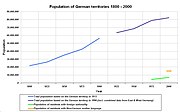
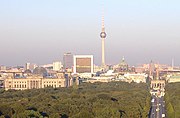
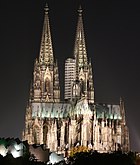

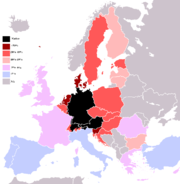


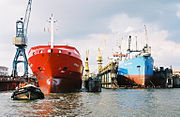




0 comments:
Post a Comment